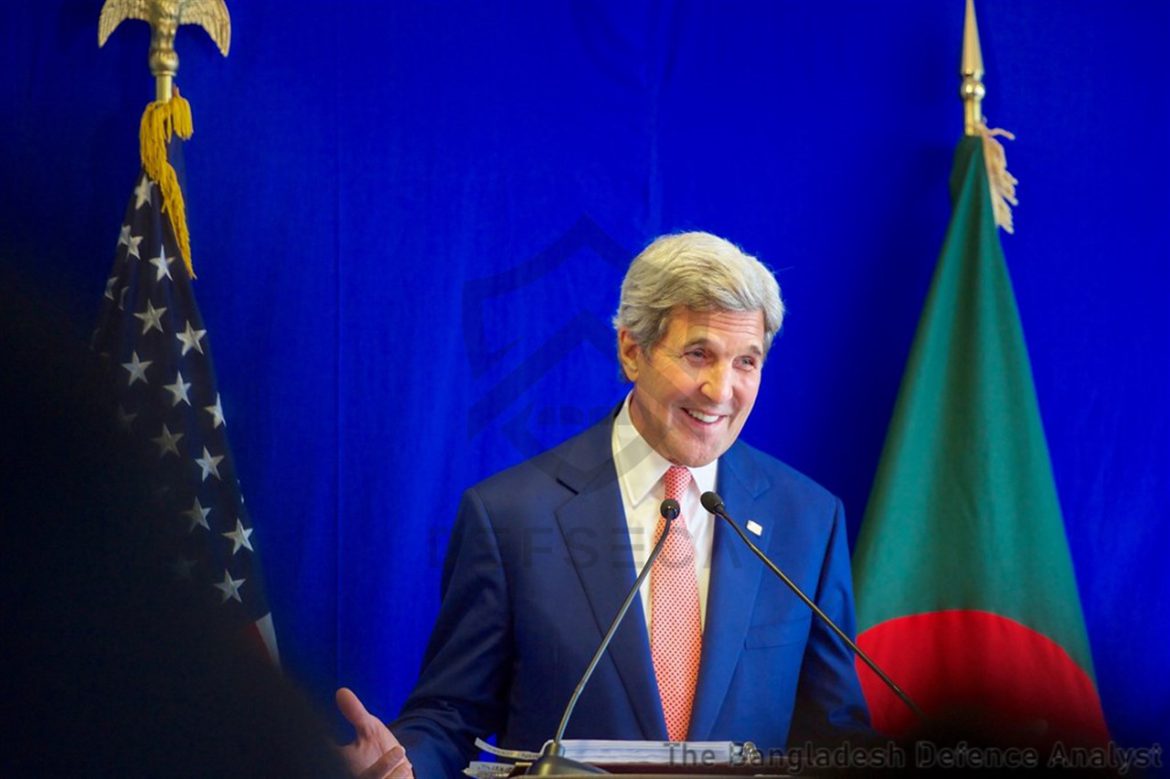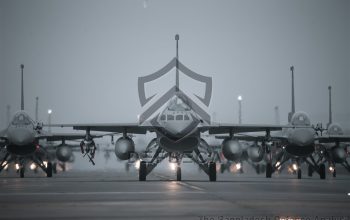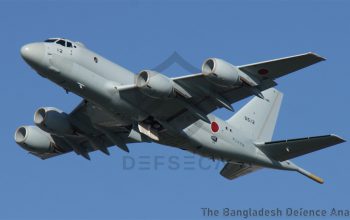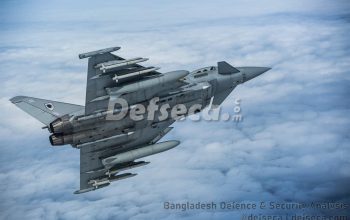A Bangladesh-first foreign policy seems to be in the making learning from the experiences and ground realities of today.
Given the geopolitical importance of Bangladesh today in the Indo-Pacific region it was only a matter of time before major power blocs focused on adding Bangladesh to their bandwagon.
On one side there is the mighty United States, which has assembled an allied force consisting of Australia, Japan, United Kingdom, South Korea, and India. Whereas on the polar opposite end is rising China with its team of delinquents such as Pakistan, Myanmar, and North Korea.
At present and possibly in the future the US may still maintain a strong lead. In fact, neither US nor China needs military support from the mentioned countries to make a stand but it does relieve a lot of pressure on their military establishment and helps to imbue a sense of security in the region.
So far the US has asked Bangladesh to sign several key framework agreements that would lead to increased defence cooperation. Bangladesh is hesitant to make any unilateral moves that might be viewed as anti-Chinese. There is good reason because the vast majority of Bangladesh’s infrastructure investments and loans were provided by China. On the other hand the US as a leading superpower enjoys strong trade relations with Bangladesh, which ultimately helped develop the South Asian country lifting millions of people out of poverty in the process.
One may say the two superpowers play a complementary role in propping up Bangladesh and this has worked out for the most part because previously none of these two powers attached conditions that might force Dhaka to choose sides.
Now all that looks like it is about to change slowly though.
The US has put sanctions on several serving and retired law enforcement officials of Bangladesh and a bar on cooperation with the Rapid Action Battalion, a paramilitary force within the Bangladesh Police established to respond to severe crimes such as terrorism, piracy, and organised crime.
Historically both the US and UK provided training to members of the Rapid Action Battalion (RAB) directly or indirectly. But now the Joe Biden administration is using classic American pressure tactics to force Bangladesh to strengthen cooperation with the US by targeting RAB.
RAB was selected by them as it was a soft target from the beginning. Human rights organisations have kept up their pressure against RAB since its raising. The US sees RAB as a conduit to pressure the Bangladesh government, while at the same time giving it enough leeway so that it does not sour existing defence cooperation between the two countries. They want to increase the level of cooperation, but if that does not work they prefer to maintain the status quo and continue to work on it.
Today the Bangladesh government will make an important decision during a cabinet meeting that might decide the fate of Bangladesh-US defence cooperation in the future.
There have been calls by different quarters of the society to reduce cooperation with the US because they believe the Americans have shown their true colours once again, reminding people the US-backed the Pakistanis during the 1971 war instead of aiding the people of Bangladesh, who were at the centre of one of the biggest genocides in human history since the Holocaust of World War II.
But the reality is Bangladesh has to take great care in dealing with the Americans. Already neighbouring India is enjoying the fruits of a strong Indo-American relationship. It is carefully cultivated by capable public servants and the Modi-BJP leadership, which has been a strong proponent for expanding security and economic cooperation with the US in an effort to counter China.
Bangladesh may opt for more of a bilateral agreement with the US, rather than join any major power blocs. It has already signed defence cooperation agreements with Turkey, India, China and Russia.
The Government of Bangladesh believes bilateral engagements would be more beneficial for Bangladesh as the partner country would be more flexible towards Bangladesh. It is something they cannot do if Bangladesh were to join any particular bloc.
With this in mind, Bangladesh is opting to gain significant economic, political, and technical access from her friendly partners. It has provided contracts to Germany to supply trainers and maritime patrol aircraft. Italy too was able to secure contracts for air defence radars, multitudes of sensors, naval weapons and defence technologies. France is also set to be awarded contracts for radar systems and multi-role combat aircraft.
The United Kingdom may also receive contracts for offshore patrol vessels and naval warships such as frigates pending further negotiations.
Traditional partners such as China and Russia continue to sell arms through bilateral mechanisms offering defence credits to Bangladesh for capital equipment purchases.
Turkey is set to join the aforementioned giants with an offer for the long-range surface to surface missiles and air defence systems. It has already supplied significant quantities of armoured vehicles to the Bangladesh Army.
With this in mind, Bangladesh could potentially sign defence agreements with the US provided it does not threaten its national interests. Even if framework agreements were to be signed it will take a good four to five years before those begin to yield results.
Bangladesh has time on its side as the country would be in a much stronger economic and technological position to absorb US-made military hardware.
Those familiar with the situation in Dhaka believe there is a possibility of the Bangladesh Air Force securing the latest F-16s and a variety of other advanced military equipment.
But as we have seen with deals before the Bangladesh government wants firstly a cost-effective solution, transfer of technology, secured supply of spare parts, access to all types of armaments, and advanced foreign training.
In the most recent times, Hurkus trainers from Turkey were supposed to be the frontrunner along with AH-64E Guardian Apache attack helicopters from Boeing, USA. Neither of them could be secured on the grounds of incompatible technicalities. But in place of those, the Bangladesh Air Force was able to negotiate several ‘good deals’ for trainers from Germany and attack helicopters from Russia.
Bangladesh’s time has arrived and with a $411 billion economy, the government has enough backbone to withstand undue foreign pressure and do what is in the interests of the country. The Sheikh Hasina-led administration in Dhaka has shown its profound depth and maturity in handling crisis of international proportions.
We expect policymakers in Bangladesh will uphold the high standards set by the Prime Minister.




